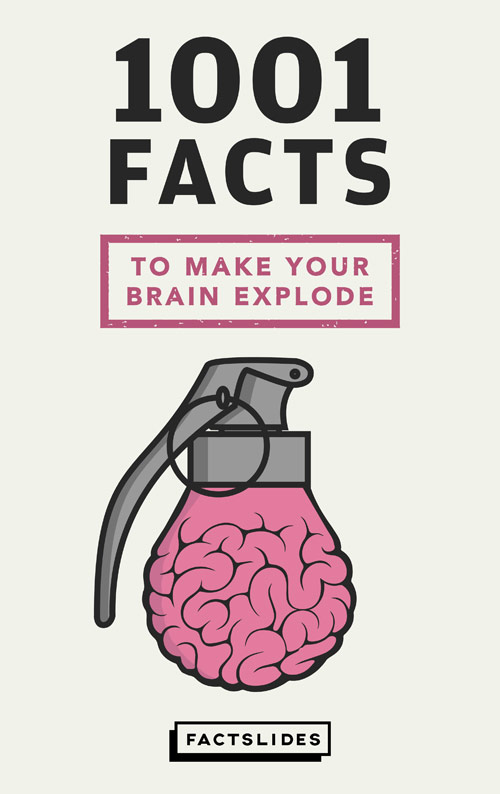All of the bacteria in our body collectively weighs about 4 pounds.
♦ SOURCE
♺ SHARE
The average office desk has 400 times more bacteria than a toilet.
♦ SOURCE
♺ SHARE
There're more bacteria in your mouth than there are people in the world.
♦ SOURCE
♺ SHARE
The "smell of rain" is caused by a bacteria called actinomycetes.
♦ SOURCE
♺ SHARE
Mobile phones have 18 times more bacteria than toilet handles.
♦ SOURCE
♺ SHARE
Researchers found 1,458 new species of bacteria in belly buttons.
♦ SOURCE
♺ SHARE
Sweat itself is odorless. It's the bacteria on the skin that mingles with it and produces body odor.
♦ SOURCE
♺ SHARE
A clean mouth has between
1,000 and 100,000 bacteria on each tooth.
♦ SOURCE
♺ SHARE
Chocolate has an anti-bacterial effect on the mouth and protects against tooth decay.
♦ SOURCE
♺ SHARE
Tap water has a shelf-life of 6 months, after which chlorine dissipates and bacteria starts to grow.
♦ SOURCE
♺ SHARE
There's a breed of bacteria that lives in hairspray.
♦ SOURCE
♺ SHARE
A dollar bill has
3,000 types of bacteria.
3,000 types of bacteria.
♦ SOURCE
♺ SHARE
When two people kiss, they exchange between 10 million and 1 billion bacteria.
♦ SOURCE
♺ SHARE
Most antibiotics are made from bacteria.
♦ SOURCE
♺ SHARE
After two weeks of wear, a pair of jeans will have grown a 1,000-strong colony of bacteria on the front, 1,500–2,500 on the back, and 10,000 on the crotch.
♦ SOURCE
♺ SHARE
The strongest creatures on Earth are gonorrhea bacteria. They can pull 100,000 times their own body weight.
♦ SOURCE
♺ SHARE
Offices with more male employees have far more bacteria.
♦ SOURCE
♺ SHARE
In 2013, a bacteria was found in New Zealand that's resistant to every single antibiotic known.
♦ SOURCE
♺ SHARE
Computer Keyboards can carry more than 200 times as many bacteria as a toilet seat.
♦ SOURCE
♺ SHARE
New bacteria grows on a kitchen sponge every 20 minutes.
♦ SOURCE
♺ SHARE
20% of office coffee mugs contain fecal bacteria.
♦ SOURCE
♺ SHARE
Babies are born with no bacteria in their bodies.
♦ SOURCE
♺ SHARE
Some 15,152 types of life forms, from insects to bacteria, have been identified on the New York subway.
♦ SOURCE
♺ SHARE
A newly-discovered species of rust-eating bacteria will have consumed the wreck of the Titanic within 20 years.
♦ SOURCE
♺ SHARE
Beans increase flatulence because they carry a type of sugar called "oligosaccharides", which are hard for bacteria to break down, so they release gas in the process.
♦ SOURCE
♺ SHARE
Airplane tray tables hold more bacteria than most typical household items, a study found.
♦ SOURCE
♺ SHARE
Horseshoe crab blood is worth US$15,000/L, due to its ability to detect bacteria.
♦ SOURCE
♺ SHARE
The chlorine in swimming pools isn't what causes red eyes. It is the chlorine binding to the bacteria in the water.
♦ SOURCE
♺ SHARE
There are viruses that infect bacteria.
♦ SOURCE
♺ SHARE
It's estimated that a third of the world's population is infected with tuberculosis bacteria, but most never have any symptoms.
♦ SOURCE
♺ SHARE
Bacteria have the smallest eyeballs in nature but the largest relative to their size.
♦ SOURCE
♺ SHARE
A report found that the free weights at the gym have 362 times more bacteria than a toilet seat.
♦ SOURCE
♺ SHARE
Bacteria and amoebas are far more different from each other than amoebas are from people.
♦ SOURCE
♺ SHARE
You can get tetanus a not just from a rusty nail but also from a perfectly clean one. It is caused by bacteria commonly found in soil, dust and animal feces.
♦ SOURCE
♺ SHARE
People infected with bacteria "C. difficile" need healthy poop transplants in their gut in order to survive. Poop samples are sold at $40 each.
♦ SOURCE
♺ SHARE



















